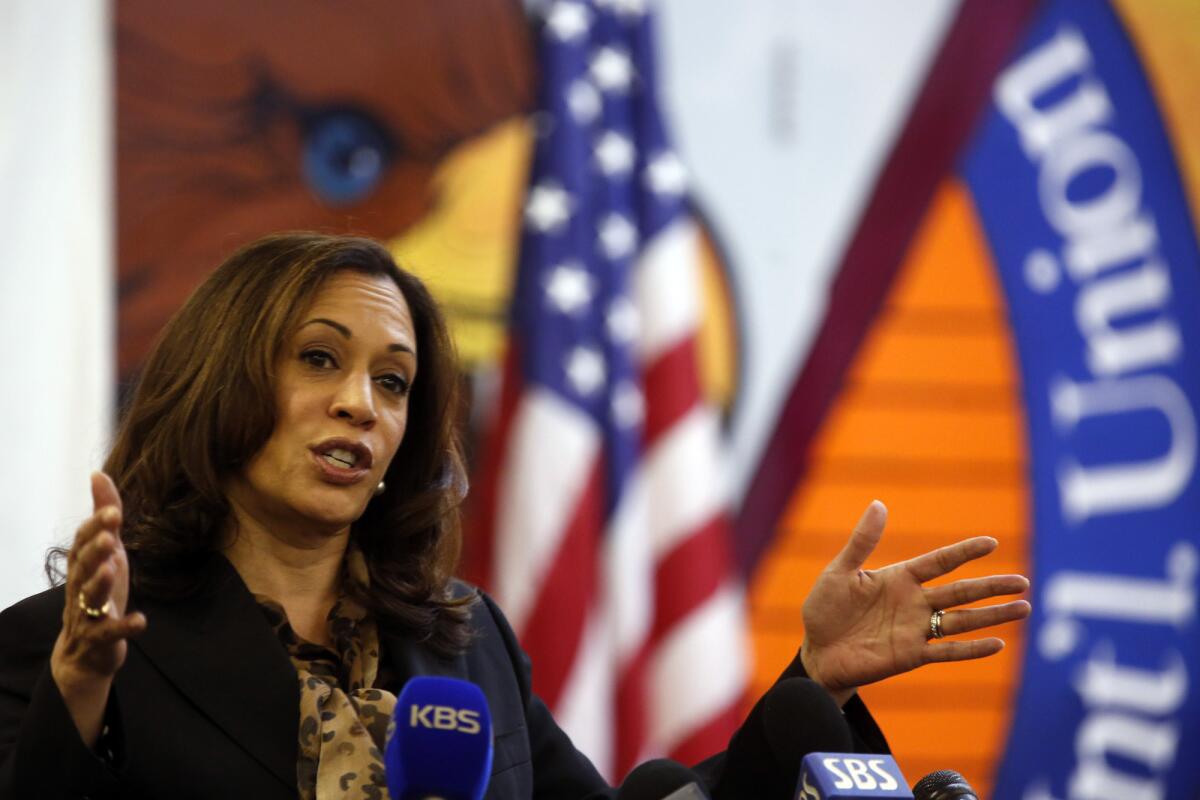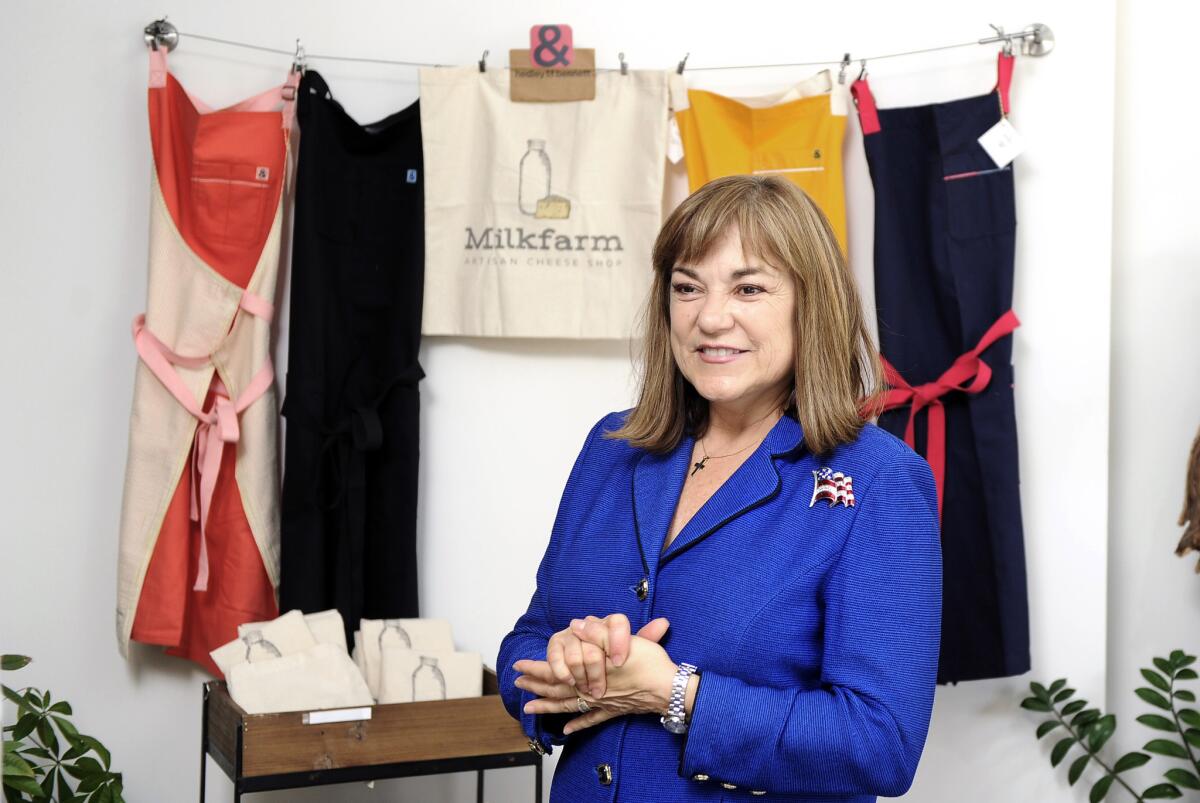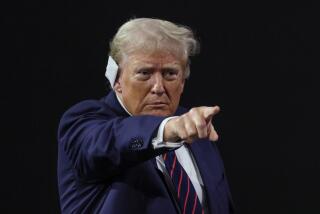‘What ifs’ and wildcards: 10 things you need to know about California’s U.S. Senate primary

Reporting from Sacramento — State Atty. Gen. Kamala Harris has dominated California’s U.S. Senate race. She rests comfortably on a solid lead in the polls and has raised twice as much campaign cash as all of her challengers combined.
So is it time for her to book a one-way ticket to Ronald Reagan Washington National Airport and start shopping for office furniture?
Not so fast.
The state’s U.S. Senate race is far from over, and there are a few political wildcards lurking that could rain — or at least deliver a nasty drizzle — on any plans for a Harris victory parade. Most of them will be sorted out in Tuesday’s primary election.

Where do things stand in California’s Senate race?
While Harris leads in the polls and has the support of the California Democratic Party, Democratic rival Rep. Loretta Sanchez of Orange County has a good shot at winning enough votes to secure a second-place finish.
According to a new USC Dornsife/Los Angeles Times poll, 28% of California registered voters surveyed said they supported Harris compared with 20% for Sanchez. No other candidate had more than 6%.
Under California’s top-two system, all Sanchez needs to do to win a ticket to the November general election is finish in second place.
Why should Harris care if Sanchez makes it to the general election?
The reason is simple: Sanchez poses the greatest threat.
Harris would much rather face a Republican in November. Why? Because the last time a Republican won a Senate race in California was 1988, and a GOP candidate hasn’t been elected to any statewide office since 2006. With the Democrats holding an edge in voter registration in California, that trend is not expected to change anytime soon.
If Sanchez makes it to the November election, it’ll be Democrat versus Democrat. That makes the race a lot more complicated. The congresswoman believes that if she wins strong support among Latino and moderate voters in November, she’ll be California’s next senator.
Do any Republicans have a chance?
The best known Republicans in the race — George “Duf” Sundheim, Tom Del Beccaro and Ron Unz — trail pretty far behind Sanchez in the USC Dornsife/Los Angeles Times poll.
Del Beccaro and Sundheim, who both served as chairmen of the California Republican Party, each had 6% support among registered voters, the poll found. Unz, who championed a 1998 initiative to end bilingual education in California, came in at just 4%.
Still, voter excitement surrounding presumptive Republican presidential nominee Donald Trump could increase GOP turnout in the primary and give the Republicans a lift. Or it might backfire and lure anti-Trump voters to the polls and juice up the vote for Harris and Sanchez.
Regardless, Republican consultant Mike Madrid says none of the Republicans has a shot at surviving past the primary unless one of them can emerge as the consensus candidate among GOP voters.
How many Senate candidates are on the ballot?
Thirty-four. So many, in fact, that elections officials are worried that voters may be confused by the massive ballot. The field is larger than any single roster of statewide contenders since the list of 135 candidates who ran in the 2003 special election that recalled then-Gov. Gray Davis.
To make the ballot, all a candidate has to do is pay about $3,500 or collect 10,000 signatures.
Who are they?
Here’s a sampling:
- Former state Sen. Phil Wyman of Tehachapi, a conservative Republican who unsuccessfully ran for attorney general in 2014. Wyman thinks California can solve its water crisis by tapping into the excess water flowing down the northern Mississippi River.
- Republican Greg Conlon, a retired accountant from Atherton who lost a race for state treasurer in 2014. He wants to reduce federal funding for all so-called sanctuary cities, municipalities that limit cooperation with federal authorities on immigration investigations.
- Republican Tom Palzar of Rancho Cucamonga, a retired government executive who tapped into his pension to run for Senate.
- No party preference candidate Jason Hanania from San Francisco, whose only statement in California’s official voter guide was in binary code: “01100101.” That translates to the letter “e,” as in “e-voting,” Hanania explained. It was, in part, a protest of the campaign finance system, he said.
- Democrat Emory Rodgers of Los Angeles, who went on a hunger strike to express his solidarity with America’s hungry and homeless.
Will they have any effect on the race?
It looks that way. A new Field poll that included all of the GOP contenders showed their support among likely voters was widely scattered. None of them registered more than 4%.
Sanchez will probably be the main beneficiary of that splintered Republican vote, since it could prevent any of them from catching her.
Why do the Republicans lag so far behind?
None of them is that well known in California, and just one has enough money to air campaign ads.
Among the Republican candidates, only Sundheim and Del Beccaro have raised more than $100,000 for their campaigns — Sundheim with $621,000 and Del Beccaro with $366,000.
By contrast, the Harris campaign has spent more than $100,000 on plane tickets alone. She has raised more than $11 million or her campaign. Sanchez brought in $3.5 million.
Why does money matter?
The number of campaign donors helping a candidate and the size of the checkscan help gauge political support. Having money also lets you buy things such as campaign yard signs and baseball caps.
Harris and Sanchez had enough money to pay for TV campaign ads on cable and broadcast stations. That’s proved to be one of the most effective, albeit expensive, ways to reach California’s 17.9 million registered voters.
Sundheim recently started airing radio ads around the state. That’s a much cheaper way to go, but still is expected to give him a boost. Del Beccaro has been a fixture on conservative talk radio shows for months — free publicity.
Will outside money affect the Senate race?
Around $1.5 million has been spent on independent expenditure campaigns as of last Friday.
That’s peanuts for a California Senate race. In fact, the same amount has been rolled into the battle over the 24th Congressional District along California’s Central Coast.
Still, it might be worrisome to Del Beccaro — and maybe Sanchez.
An organization called Californians for Fiscal Responsibility has spent more than $1.1 million to oppose Del Beccaro, mostly on campaign mailers accusing him of “fiscal mismanagement” when he was the state party chairman. The committee also forked out more than $208,000 to support Sundheim, again mostly for direct mail.
Del Beccaro has accused Republican mega-donor Charles Munger Jr. of orchestrating that campaign, saying Munger has a “vendetta” against him because of his conservative views. Munger, who in the past has said Del Beccaro left the state GOP in shambles, declined to comment. His spokesman would say only that Munger “is a contributor to the committee.”
Munger’s political organization Spirit of Democracy America also spent $53,000 on an independent expenditure campaign supporting Sundheim.
The question is whether those outside campaigns will do enough to lift Sundheim past Sanchez on Tuesday.
What makes this race so hard to predict?
There still are a lot of unknowns.
According to the new USC Dornsife/Los Angeles Times poll, 27% of registered voters said they were undecided about the Senate race — and that included a lot of Republicans. It’s anyone’s guess how they will vote — or if they will vote.
Political experts expect a number of Californians who vote in the Democratic and Republican presidential races to skip voting in the Senate race. It’s called an “undervote,” and it’s extremely difficult to predict how large it will be or which Senate candidate would gain an advantage.
California’s voter rolls grew by almost 650,000 in the final six weeks of registration. Three of every four new voters were Democrats.
It’s tough to forecast which box those new voters will check. Maybe they registered to oppose or support Trump. Maybe they’re big fans of Democratic presidential candidate Bernie Sanders. Each scenario could create different political undercurrents that affect the vote in the Senate race.
Election 2016 | California politics news feed | Sign up for the newsletter
Twitter: @philwillon
ALSO:
Poll finds Senate hopeful Loretta Sanchez strong among Latino voters but few others
These California mega-donors haven’t given a penny in the U.S. Senate race
Kamala Harris is focus of California’s final U.S. Senate debate before primary
Updates on California politics
More to Read
Get the L.A. Times Politics newsletter
Deeply reported insights into legislation, politics and policy from Sacramento, Washington and beyond. In your inbox three times per week.
You may occasionally receive promotional content from the Los Angeles Times.











